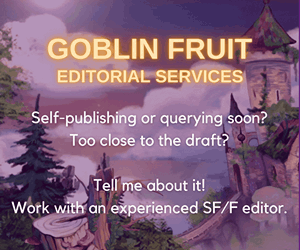This story first appeared in my anthology HELP FUND MY ROBOT ARMY!!! & Other Improbable Crowdfunding Projects. Besides writing a story with the theme in mind, what was the genesis of the story?
I’ve actually always kicked (ha) around the idea of writing a Kickstarter-shaped story, but this anthology gave me the kick (HA) in the pants that I needed. I really liked Keffy’s “Help Fund My Robot Army!!!” story that inspired the anthology, and I wanted to try the form while taking a less humorous approach. I wanted to use this very modern conceit to illustrate a tragedy.
Was this story a particularly challenging one to write? If so, how?
It was! The structure was complicated because Kickstarters have so many moving parts, and there are so many decisions to be made: Do I put the updates in chronological order, or backwards like they appear on the site? Do I try and write a transcription of a video? In what order should I present the comments, updates, and messages? Because a Kickstarter page is so visual, I had to try and figure out the most natural and dramatically appropriate order in which to present these sections.
That being said, it was a pleasure to have those concerns—it pushed open some new creative paths for me that I might not have otherwise taken. I love conceits and formal constraints for this very reason. In his book Many Subtle Channels: In Praise of Potential Literature, Daniel Levin Becker quotes one of the founders of Oulipo, a French constrained literature movement, who said “In the world we live in, we are beholden to all manner of terrible constraints—mental, physical, societal—with death the only way out of the labyrinth. The least we can do is mark off a little section where we get to choose the constraints we are mastered by, where we decide which direction to take.” I love that.
Most authors say all their stories are personal. If that’s true for you, in what way was this story personal to you?
It’s definitely personal for me, but in a way I don’t want to (or should have to for the reader to appreciate the story) talk about. Death of the author and all that.
What kind of research did you have to do for the story?
Mostly I looked at dozens of random Kickstarter pages to get a sense of the form and see what people did with real projects. I also did some cursory investigation into the magical properties of certain herbs.
What are your thoughts about crowdfunding generally? Do you back a lot of Kickstarters, or at least find a lot of interesting projects because of crowdfunding?
I’ve backed a bunch of Kickstarters—lots of anthologies, the occasional video game, film, or album, the recent one to bring back Reading Rainbow. It’s never very much, but if I believe in the project, I try to contribute in some small way.
How do you think Kickstarter and self-publishing platforms (like Amazon’s KDP, etc.) are changing publishing?
I like how anthologies can get a jump-start via crowdfunding. It helps amazing projects come to life and allows writers to get paid, which are two of my favorite things.
What are some examples of fiction you like in which the format helped dictate the story?
The list is too long to include in its entirety, but some of my personal favorites are: Catherynne M. Valente’s “A Buyer’s Guide to Maps of Antarctica,” Kevin Brockmeier’s “The Human Soul as a Rube Goldberg Device,” Nicholson Baker’s Vox, Alice Sola Kim’s “Hwang’s Billion Brilliant Daughters,” Italo Calvino’s Invisible Cities, C.C. Finlay’s “Footnotes,” Paul Violi’s “Index,” Matt Bell’s “An Index of How Our Family Was Killed,” J.G. Ballard’s “The Index,” and Harry Mathew’s ”Country Cooking from Central France: Roast Boned Rolled Stuffed Shoulder of Lamb (Farce Double).”
Enjoyed this article? Consider supporting us via one of the following methods:









